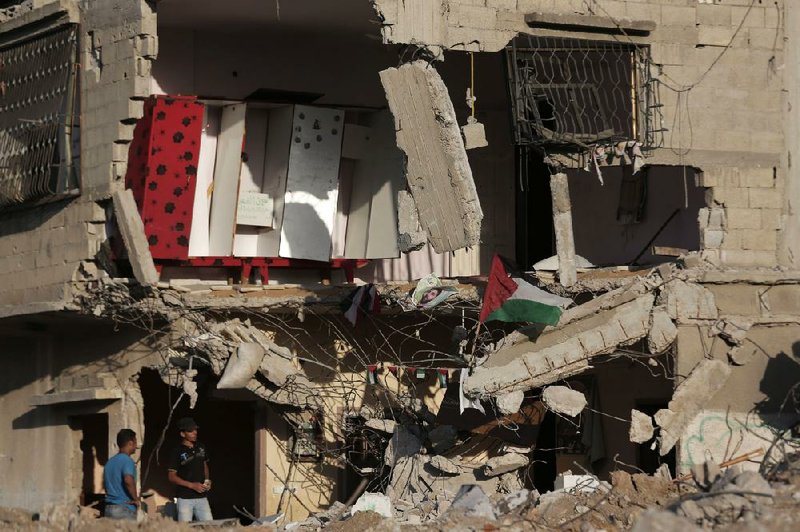JERUSALEM -- Two rockets were fired from the Gaza Strip early today, landing in empty fields in southern Israel just hours before the expiration of the 72-hour cease-fire that ended a month of violence, the Israeli army said.
The rockets fell into an open area in southern Israel and caused no casualties, it added. There was no immediate Israeli military response.
No one claimed responsibility for the rockets and it was not clear whether the Hamas militant group had fired them. There are a number of militant groups in the crowded territory that operate outside the control of Hamas with rockets of their own.
Hamas on Thursday had rejected Israeli demands that it disarm and threatened to resume its rocket attacks if its demands for lifting a blockade on Gaza were not met.
A senior Hamas official said today that the group has decided not to extend the cease-fire. He said Hamas representatives were told by Egyptian mediators that Israel had rejected Hamas' conditions for an extension -- an agreement in principle to open Gaza's borders and allow for a rebuilding of the strip. The official spoke on condition of anonymity because he was on his way to inform Egyptian officials of the decision.
A text message from Hamas' military wing, the Izzedine al-Qassam Brigades, warned earlier there would be no extension of the cease-fire if there was no agreement to permanently lift the blockade enforced by Israel and Egypt since Hamas overran Gaza in 2007.
Abu Obeida, the al-Qassam spokesman, appeared on the group's Al-Aqsa TV station and said Hamas was "ready to go to war again." He threatened to launch a long-term war of attrition that would cripple life in Israel's big cities and disrupt air traffic at Israel's international airport in Tel Aviv.
He also appealed to Hamas negotiators in Egypt not to accept an extension of the cease-fire without an agreement on lifting the blockade. "The resistance is capable of imposing its conditions," he said.
A security official in Egypt said Egyptian negotiators were struggling to get the two sides closer together, with one official saying Hamas and other Gaza militants were refusing to compromise.
Israeli Prime Minister Benjamin Netanyahu vowed a tough reaction if Hamas renews hostilities.
"They might reject an extension. If they attack us, we'll respond in kind, as any government would," he told Germany's ZDF television.
An Israeli defense official said Israel would respond "forcefully," and that Netanyahu and his defense minister, Moshe Yaalon, had instructed the military "to be ready for anything." He spoke on condition of anonymity because he was not authorized to talk to the media.
In the fighting, nearly 1,900 Palestinians, three-quarters of them civilians, were killed, more than 9,000 wounded and some 250,000 people made homeless, according to Palestinian medical officials and the United Nations. Israel lost 64 soldiers and three civilians.
Hamas, meanwhile, announced that Ayman Taha, a former spokesman for the group, died Thursday of wounds suffered in an Israeli airstrike on a makeshift Hamas detention center 11 days earlier. Taha had been detained by Hamas security in January, though the charges against him were never made public. Before his arrest, Taha also had served as a liaison with Egypt.
He was the first senior member of the Hamas political leadership to be killed in this war.
Hamas has demanded the lifting of an Israeli and Egyptian blockade imposed on the coastal territory. Israel has said the militants must disarm first, which al-Masri rejected.
"It is out of the question that the weapons of the resistance should be on the negotiating table. They have not been put on the table and, God willing, they will never be," he said.
Al-Masri also insisted that Hamas fighters were "in good shape" despite four weeks of fighting and said the militants still had tunnels extending into Israel that could be used for attacks if the group's demands are not met.
Addressing communities in southern Israel close to Gaza, an area that suffered the most from Hamas rockets, he said: "You are advised not to return to your homes. ... Netanyahu is gambling with your lives for political gain."
The blockade, which Israel says is needed to prevent weapons from reaching Gaza, has led to widespread hardship in the Mediterranean seaside territory. Movement in and out of Gaza is limited, the economy has ground to a standstill and unemployment is over 50 percent.
Information for this article was contributed by Ibrahim Barzak, Ian Deitch, Raf Cassert and staff members of The Associated Press.
A Section on 08/08/2014


